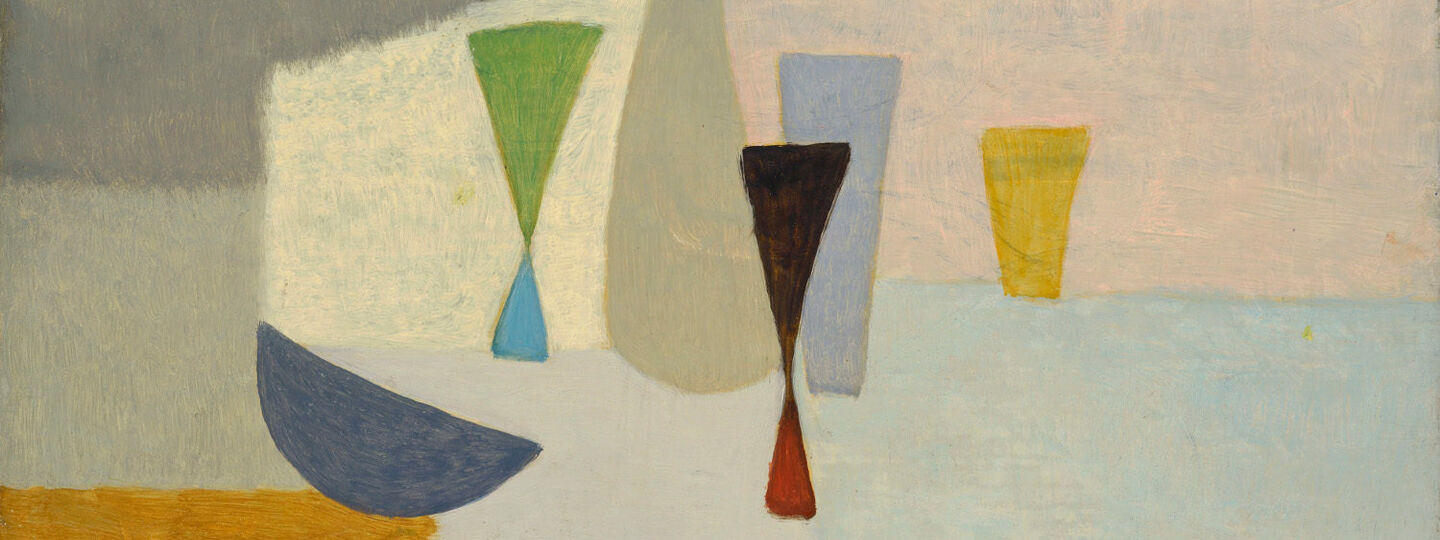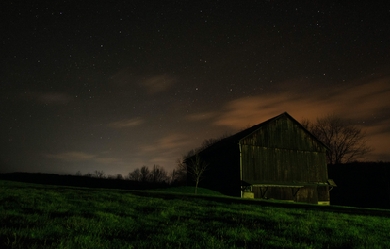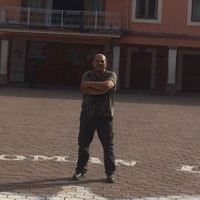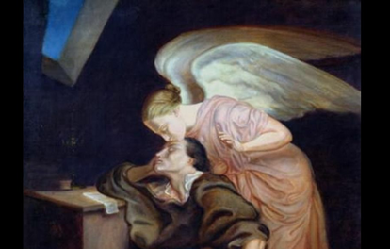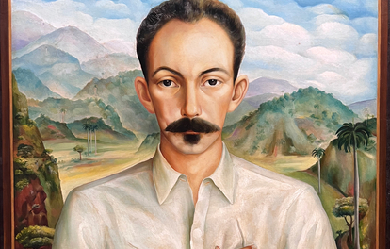
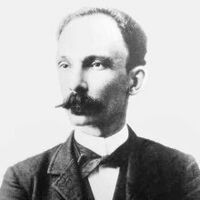
José Julián Martí Pérez (La Habana, Cuba, 28 de enero de 1853 – Dos Ríos, Cuba, 19 de mayo de 1895) fue un político liberal, pensador, periodista, filósofo y poeta cubano, creador del Partido Revolucionario Cubano y organizador de la Guerra del 95 o Guerra Necesaria. Perteneció al movimiento literario del modernismo.

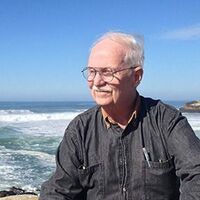
POETRY: * Influenced by the passion and vibrant imagery created by the words of Khalil Gibran, Pablo Neruda, Grace Chacon Leon, Catherine Stanger, Cory Garcia, Nelson Reyes, and J Ann Crowder. * Author of six books; "Wings of Inspiration," "Rhymes of the Joke Machine," "The Air Almighty," "Martin's World," "Secrets of the Wind," and "Mother of Life." (published by Cyberwit.net), Published works in Mature Years, Alive Now, Torrid Literature Journal, Universal Oneness Anthology, Taj Mahal Review, Inkling Magazine, Page & Spine, Charles Carter Anthologies, Purpose Magazine, Terror House Magazine, Brief Wilderness, Cowboy Poetry Press, The Voices Project, Aberration Labyrinth, Long Shot Books, Academy of Hearts & Minds, Blue Lake Review, Gival Press, The Higgs Weldon, Funny In Five Hundred, Verse-Virtual, Wilderness House Literary Review, White Liquor Mag, Ygdrasil Literary Journal, Poetica, Green Silk Journal, Madswirl, Lyrical Passion Poetry E-Zine, Poet's Pen, Storyteller, FreeXpression, Poets' Espresso, Long Story Short, Oddball Magazine, Asinine Poetry, Write On!!, American Legion On-Line, Pegasus Review, Prayerworks, Stepping Stones, Love's Chance, Poet's Haven, Jerry Jazz Musician, Fullosia Press, The Sheltered Poet, The Belt and Beyond, Blue Minaret, and Ego Phobia. * Wrote two chapbooks entitled "In Reverence to Life" and "A Sage's Diary," (published by In His Steps Publishing). Won two poetry awards (Faith and Hope) and appeared in many anthology books. MUSIC: * Playing, writing, and arranging music for most of life. * Studied music at Westlake College of Music in Hollywood, California in 1958 and majored in piano. * Played in the 82nd Army Band in Stuttgard, Germany from 1962 until 1964. * Played in the Jimmy Dorsey Band in 1965. * Played in a band in Bergen, Norway in 1966. * Composed score for Dr. Ira Cochin's Rally George in Valley Forge children's play. * Playing the organ at 1st Methodist Church in Wind Gap, PA for the past thirty years... THE REST OF LIFE: Born in Ashtabula, Ohio, and moved to New York City shortly thereafter. Got married in 1984 and had a wonderful daughter in 1985. Can be found at his home in Bangor, PA at his keyboard, or in front of a yellow legal pad, pen in hand...
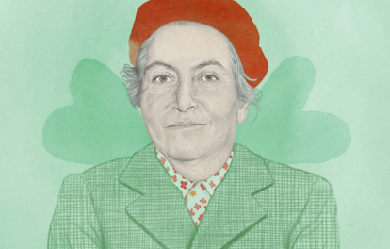
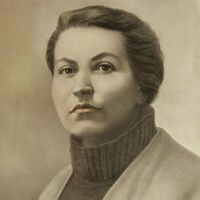
Gabriela Mistral, seudónimo de Lucila Godoy Alcayaga, (Vicuña, 7 de abril de 1889-Nueva York, 10 de enero de 1957) fue una poetisa, diplomática, profesora y pedagoga chilena. Por su trabajo poético, recibió el Premio Nobel de Literatura en 1945. Fue la primera mujer iberoamericanan y la segunda persona latinoamericanan en recibir un Premio Nobel. Carta a Gabriela por Juana de Ibarbourou, 1957 ¿Por qué caminos del alba andas descubriendo el cielo ese, prometido a unos los que sufrimos, creemos y le pedimos a Dios ir a bruñir sus luceros ? ¿Por qué sendas, asombrada, ya vas encontrando el cielo, mientras aquí las banderas y pueblos, están de duelo.? ¿Por qué te fuiste, tan pronto precipitando el invierno cuando aún, lleno de flores, se desgranaba febrero? Yucas y conquistadores te irán formando cortejo; Pizarro barbado y noble —bronce, plata, encaje, acero— con una ciudad de torres entre sus brazos sin huesos. Y una muchedumbre oscura que va detrás de Atahualpa te sigue cantando himnos en lengua quechua y aymara. Ya estás, Gabriela, en la gloria, mitad de princesa incaica, mitad de reina española, como Isabel, la magnánima. Ya sé que no has de escribir a nadie mas en la tierra, que oficinas de correo a la eternidad se veda. ¡Pero es tan dulce que sepas Gabriela, que toda América por ti está tan conmovida como tu patria chilena...! El cielo junto al copihue la orquídea venezolana se une a la victoria-regia del Brasil, y en la sabana de Colombia, los gomeros detienen su savia trágica. ¡Toda la flora de América quiere mirarte la cara! Asómate entre las nubes una tarde arrebolada; muéstranos tu frente ancha de madre tan bien amada, ¡déjanos poquito a poco, del todo no te nos vayas! Aquí ha quedado tu verso, tu palabra estructurada con lo mejor del idioma y lo mejor de tu alma. Pero nos falta tu rostro con la sonrisa cansada, que a todos nos descansaba cuando nos daba en los ojos. Oye, Gabriela, las voces desde tu «bosque perfecto» damos la señal que diga que llega a ti nuestro acento, y repasa, tu que tanto sobre la tierra anduviste, ¡reposa y se haga radiante su risa aquella, tan triste! Descubre el cielo y descansa, pero, Gabriela ¡no olvides!

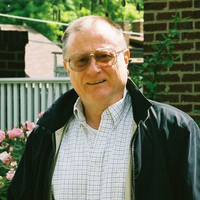
Donal Mahoney, a native of Chicago, lives in St. Louis, Missouri. His fiction and poetry have appeared in various publications, including The Wisconsin Review, The Kansas Quarterly, The South Carolina Review, The Christian Science Monitor, The Beloit Poetry Journal, Commonweal, The Galway Review (Ireland), Public Republic (Bulgaria), Revival (Ireland), The Istanbul Literary Review (Turkey) and other magazines. Some of his earliest work can be found at http://booksonblog12.blogspot.com; some newer work at http://eyeonlifemag.com/the-poetry-locksmith/donal-mahoney-poet.html#sthash.OSYzpgmQ.dpbs=
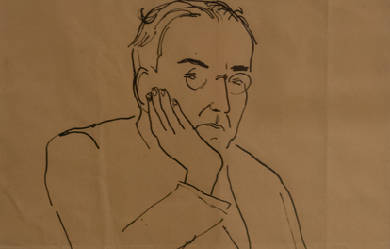
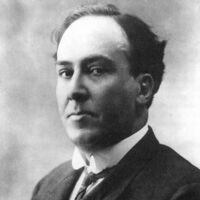
Antonio Machado Ruiz (Sevilla, 26 de julio de 1875 – Colliure, Francia, 22 de febrero de 1939) fue un poeta español, miembro tardío de la Generación del 98 y uno de sus miembros más representativos. Su obra inicial suele inscribirse en el movimiento literario denominado Modernismo. Fue el segundo de cinco hermanos de una familia liberal; el mayor de ellos, Manuel, trabajó junto a Antonio en varias obras.

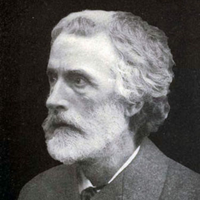
George Meredith, OM (12 February 1828 – 18 May 1909) was an English novelist and poet of the Victorian era. Meredith was born in Portsmouth, England, a son and grandson of naval outfitters. His mother died when he was five. At the age of 14 he was sent to a Moravian School in Neuwied, Germany, where he remained for two years. He read law and was articled as a solicitor, but abandoned that profession for journalism and poetry. He collaborated with Edward Gryffydh Peacock, son of Thomas Love Peacock in publishing a privately circulated literary magazine, the Monthly Observer. He married Edward Peacock's widowed sister Mary Ellen Nicolls in 1849 when he was twenty-one years old and she was twenty-eight. He collected his early writings, first published in periodicals, into Poems, published to some acclaim in 1851. His wife ran off with the English Pre-Raphaelite painter Henry Wallis [1830–1916] in 1858; she died three years later. The collection of "sonnets" entitled Modern Love (1862) came of this experience as did The Ordeal of Richard Feverel, his first "major novel". He married Marie Vulliamy in 1864 and settled in Surrey. He continued writing novels and poetry, often inspired by nature. His writing was characterised by a fascination with imagery and indirect references. He had a keen understanding of comedy and his Essay on Comedy (1877) is still quoted in most discussions of the history of comic theory. In The Egoist, published in 1879, he applies some of his theories of comedy in one of his most enduring novels. Some of his writings, including The Egoist, also highlight the subjugation of women during the Victorian period. During most of his career, he had difficulty achieving popular success. His first truly successful novel was Diana of the Crossways published in 1885. Meredith supplemented his often uncertain writer's income with a job as a publisher's reader. His advice to Chapman and Hall made him influential in the world of letters. His friends in the literary world included, at different times, William and Dante Gabriel Rossetti, Algernon Charles Swinburne, Leslie Stephen, Robert Louis Stevenson, George Gissing and J. M. Barrie. His contemporary Sir Arthur Conan Doyle paid him homage in the short-story The Boscombe Valley Mystery, when Sherlock Holmes says to Dr. Watson during the discussion of the case, "And now let us talk about George Meredith, if you please, and we shall leave all minor matters until to-morrow." Oscar Wilde, in his dialogue The Decay of Lying, implies that Meredith, along with Balzac, is his favourite novelist, saying "Ah, Meredith! Who can define him? His style is chaos illumined by flashes of lightning". In 1868 he was introduced to Thomas Hardy by Frederick Chapman of Chapman & Hall the publishers. Hardy had submitted his first novel, The Poor Man and the Lady. Meredith advised Hardy not to publish his book as it would be attacked by reviewers and destroy his hopes of becoming a novelist. Meredith felt the book was too bitter a satire on the rich and counselled Hardy to put it aside and write another 'with a purely artistic purpose' and more of a plot. Meredith spoke from experience; his first big novel, The Ordeal of Richard Feverel, was judged so shocking that Mudie's circulating library had cancelled an order of 300 copies. Hardy continued to try and publish the novel: however it remained unpublished, though he clearly took Meredith's advice seriously. Before his death, Meredith was honoured from many quarters: he succeeded Lord Tennyson as president of the Society of Authors; in 1905 he was appointed to the Order of Merit by King Edward VII. In 1909, he died at his home in Box Hill, Surrey. Works Essays * Essay on Comedy (1877) Novels * The Shaving of Shagpat (1856) * Farina (1857) * The Ordeal of Richard Feverel (1859) * Evan Harrington (1861) * Emilia in England (1864), republished as Sandra Belloni in 1887 * Rhoda Fleming (1865) * Vittoria (1867) * The Adventures of Harry Richmond (1871) * Beauchamp's Career (1875) * The House on the Beach (1877) * The Case of General Ople and Lady Camper (1877) * The Tale of Chloe (1879) * The Egoist (1879) * The Tragic Comedians (1880) * Diana of the Crossways (1885) * One of our Conquerors (1891) * Lord Ormont and his Aminta (1894) * The Amazing Marriage (1895) * Celt and Saxon (1910) Poetry * Poems (1851) * Modern Love (1862) * Poems and Lyrics of the Joy of Earth (1883) * The Woods of Westermain (1883) * A Faith on Trial (1885) * Ballads and Poems of Tragic Life (1887) * A Reading of Earth (1888) * The Empty Purse (1892) * Odes in Contribution to the Song of French History(1898) * A Reading of Life (1901) * Last Poems (1909) * Lucifer in Starlight * The Lark Ascending (the inspiration for Vaughan Williams' instrumental work The Lark Ascending). References Wikipedia - http://en.wikipedia.org/wiki/George_Meredith
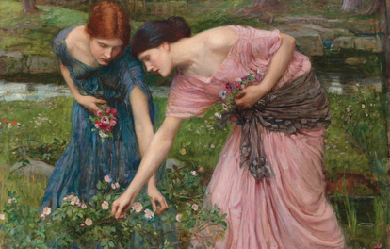

Doris Melo Mendoza,(1948-) Nació en Santo Domingo, República Dominicana. Vive en Puerto Rico desde 1989. Obtuvo un grado de Licenciada en Psicología clínica en 1975 de la Universidad Autónoma de Santo Domingo. En el 2004 obtuvo su maestría en Artes con concentración en Estudios Hispánicos y un Doctorado en Filosofía con concentración en Literatura Hispanoamericana, ambos de la Universidad de Puerto Rico en Río Piedras. Ha publicado numerosos ensayos y artículos en revistas especializadas en literatura en Hispanoamerica y España. Algunos de sus poemas han aparecido en varias antologías como "Pinceladas y relatos (2010), Prosa, poesía y artistas plásticos".(2011), "Antología de mujeres". Ha prologado varios libros como: “Arena, mar y viento”. (2010) del poeta español Teo Revilla Bravo, “La mujer espiral” (2012) de la poeta dominicana Jennet Tineo, “El espacio mítico de la palabra en el desmadejar del tiempo: en el poemario “El ave rasga la memoria” de Valentín Amaro. poeta dominicano.(2014), “Polifonía de voces que se resisten al encuentro de multiples mundos de una conciencia poética”. Del poeta español José Huete García entre otros. Como poeta ha publicado dieciocho libros: Solo de pasión, soledades y otras ausencias en abril del (2010) y El olor de la palabra rota en septiembre del (2011) , Rasgada memoria (2012) En ese espacio de nadie donde gravita la prudencia.(2013), "Donde habita el recuerdo" (2017) , "En esta brevedad que se dispersa "(2017, entre otros. Además escribe crítica literaria. Ha publicado el trabajo crítico sobre teatro: "Mito y tragedia en el teatro hispanoamericano y dominicano del siglo XX" (2011 ) "La agonía, el esplendor y la locura en el arte a través del tiempo" (2018) "El devenir: de lo disoluto a la enajenación en los poetas malditos" (2018) "Ensayos de crítica literaria: prosa y poesía. (2017)" entre otros. Además comparte poemas en : La antología "Rompamos el silencio Amazonas" editado en alemán y español por Katia Japa. Alemania (2014.) Estudió Artes Plásticas: dibujo, pintura, litografía y xilografía. Idiomas: francés, italiano, portugués y latín en la Universidad de Puerto Rico en Río Piedras. Ha sido profesora del departamento de Español y Literatura y Humanidades en Estudios Generales, en las Universidades de Puerto Rico, Recinto de Río Piedras y actualmente enseña en La Escuela de Artes Plásticas de San Juan donde enseña: Redacción, Humanidades y tesina.
_and_brother_Ronald_-_Google_Art_Project.jpg)
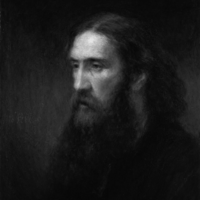
George MacDonald (10 December 1824– 18 September 1905) was a Scottish author, poet, and Christian minister. He was a pioneering figure in the field of fantasy literature and the mentor of fellow writer Lewis Carroll. His writings have been cited as a major literary influence by many notable authors including W. H. Auden, C. S. Lewis, J. R. R. Tolkien, Walter de la Mare, E. Nesbit and Madeleine L’Engle. C. S. Lewis wrote that he regarded MacDonald as his “master”: “Picking up a copy of Phantastes one day at a train-station bookstall, I began to read. A few hours later,” said Lewis, “I knew that I had crossed a great frontier.” G. K. Chesterton cited The Princess and the Goblin as a book that had “made a difference to my whole existence”. Elizabeth Yates wrote of Sir Gibbie, “It moved me the way books did when, as a child, the great gates of literature began to open and first encounters with noble thoughts and utterances were unspeakably thrilling.” Even Mark Twain, who initially disliked MacDonald, became friends with him, and there is some evidence that Twain was influenced by MacDonald. Christian author Oswald Chambers (1874–1917) wrote in Christian Disciplines, vol. 1, (pub. 1934) that “it is a striking indication of the trend and shallowness of the modern reading public that George MacDonald’s books have been so neglected”. In addition to his fairy tales, MacDonald wrote several works on Christian apologetics including several that defended his view of Christian Universalism. Early life George MacDonald was born on 10 December 1824 at Huntly, Aberdeenshire, Scotland. His father, a farmer, was one of the MacDonalds of Glen Coe, and a direct descendant of one of the families that suffered in the massacre of 1692. The Doric dialect of the Aberdeenshire area appears in the dialogue of some of his non-fantasy novels. MacDonald grew up in the Congregational Church, with an atmosphere of Calvinism. But MacDonald never felt comfortable with some aspects of Calvinist doctrine; indeed, legend has itt that when the doctrine of predestination was first explained to him, he burst into tears (although assured that he was one of the elect). Later novels, such as Robert Falconer and Lilith, show a distaste for the idea that God’s electing love is limited to some and denied to others. MacDonald graduated from the University of Aberdeen, and then went to London, studying at Highbury College for the Congregational ministry. In 1850 he was appointed pastor of Trinity Congregational Church, Arundel, but his sermons (preaching God’s universal love and the possibility that none would, ultimately, fail to unite with God) met with little favour and his salary was cut in half. Later he was engaged in ministerial work in Manchester. He left that because of poor health, and after a short sojourn in Algiers he settled in London and taught for some time at the University of London. MacDonald was also for a time editor of Good Words for the Young, and lectured successfully in the United States during 1872–1873. Work George MacDonald’s best-known works are Phantastes, The Princess and the Goblin, At the Back of the North Wind, and Lilith, all fantasy novels, and fairy tales such as “The Light Princess”, “The Golden Key”, and “The Wise Woman”. “I write, not for children,” he wrote, “but for the child-like, whether they be of five, or fifty, or seventy-five.” MacDonald also published some volumes of sermons, the pulpit not having proved an unreservedly successful venue. MacDonald also served as a mentor to Lewis Carroll (the pen-name of Rev. Charles Lutwidge Dodgson); it was MacDonald’s advice, and the enthusiastic reception of Alice by MacDonald’s many sons and daughters, that convinced Carroll to submit Alice for publication. Carroll, one of the finest Victorian photographers, also created photographic portraits of several of the MacDonald children. MacDonald was also friends with John Ruskin and served as a go-between in Ruskin’s long courtship with Rose La Touche. MacDonald was acquainted with most of the literary luminaries of the day; a surviving group photograph shows him with Tennyson, Dickens, Wilkie Collins, Trollope, Ruskin, Lewes, and Thackeray. While in America he was a friend of Longfellow and Walt Whitman. In 1877 he was given a civil list pension. From 1879 he and his family moved to Bordighera in a place much loved by British expatriates, the Riviera dei Fiori in Liguria, Italy, almost on the French border. In that locality there also was an Anglican Church, which he attended. Deeply enamoured of the Riviera, he spent there 20 years, writing almost half of his whole literary production, especially the fantasy work. In that Ligurian town MacDonald founded a literary studio named Casa Coraggio (Bravery House), which soon became one of the most renowned cultural centres of that period, well attended by British and Italian travellers, and by locals. In that house representations were often held of classic plays, and readings were given of Dante and Shakespeare. In 1900 he moved into St George’s Wood, Haslemere, a house designed for him by his son, Robert Falconer MacDonald, and the building overseen by his eldest son, Greville MacDonald. He died on 18 September 1905 in Ashtead, (Surrey). He was cremated and his ashes buried in Bordighera, in the English cemetery, along with his wife Louisa and daughters Lilia and Grace. As hinted above, MacDonald’s use of fantasy as a literary medium for exploring the human condition greatly influenced a generation of such notable authors as C. S. Lewis (who featured him as a character in his The Great Divorce), J. R. R. Tolkien, and Madeleine L’Engle. MacDonald’s non-fantasy novels, such as Alec Forbes, had their influence as well; they were among the first realistic Scottish novels, and as such MacDonald has been credited with founding the “kailyard school” of Scottish writing. His son Greville MacDonald became a noted medical specialist, a pioneer of the Peasant Arts movement, and also wrote numerous fairy tales for children. Greville ensured that new editions of his father’s works were published. Another son, Ronald MacDonald, was also a novelist. Ronald’s son, Philip MacDonald, (George MacDonald’s grandson) became a very well known Hollywood screenwriter. Theology MacDonald rejected the doctrine of penal substitutionary atonement as developed by John Calvin, which argues that Christ has taken the place of sinners and is punished by the wrath of God in their place, believing that in turn it raised serious questions about the character and nature of God. Instead, he taught that Christ had come to save people from their sins, and not from a Divine penalty for their sins. The problem was not the need to appease a wrathful God but the disease of cosmic evil itself. George MacDonald frequently described the Atonement in terms similar to the Christus Victor theory. MacDonald posed the rhetorical question, “Did he not foil and slay evil by letting all the waves and billows of its horrid sea break upon him, go over him, and die without rebound—spend their rage, fall defeated, and cease? Verily, he made atonement!” MacDonald was convinced that God does not punish except to amend, and that the sole end of His greatest anger is the amelioration of the guilty. As the doctor uses fire and steel in certain deep-seated diseases, so God may use hell-fire if necessary to heal the hardened sinner. MacDonald declared, “I believe that no hell will be lacking which would help the just mercy of God to redeem his children.” MacDonald posed the rhetorical question, “When we say that God is Love, do we teach men that their fear of Him is groundless?” He replied, “No. As much as they fear will come upon them, possibly far more.... The wrath will consume what they call themselves; so that the selves God made shall appear.” However, true repentance, in the sense of freely chosen moral growth, is essential to this process, and, in MacDonald’s optimistic view, inevitable for all beings (see universal reconciliation). He recognised the theoretical possibility that, bathed in the eschatological divine light, some might perceive right and wrong for what they are but still refuse to be transfigured by operation of God’s fires of love, but he did not think this likely. In this theology of divine punishment, MacDonald stands in opposition to Augustine of Hippo, and in agreement with the Greek Church Fathers Clement of Alexandria, Origen, and St. Gregory of Nyssa, although it is unknown whether MacDonald had a working familiarity with Patristics or Eastern Orthodox Christianity. At least an indirect influence is likely, because F. D. Maurice, who influenced MacDonald, knew the Greek Fathers, especially Clement, very well. MacDonald states his theological views most distinctly in the sermon Justice found in the third volume of Unspoken Sermons. In his introduction to George MacDonald: An Anthology, C. S. Lewis speaks highly of MacDonald’s theology: “This collection, as I have said, was designed not to revive MacDonald’s literary reputation but to spread his religious teaching. Hence most of my extracts are taken from the three volumes of Unspoken Sermons. My own debt to this book is almost as great as one man can owe to another: and nearly all serious inquirers to whom I have introduced it acknowledge that it has given them great help—sometimes indispensable help toward the very acceptance of the Christian faith. ... I know hardly any other writer who seems to be closer, or more continually close, to the Spirit of Christ Himself. Hence his Christ-like union of tenderness and severity. Nowhere else outside the New Testament have I found terror and comfort so intertwined.... In making this collection I was discharging a debt of justice. I have never concealed the fact that I regarded him as my master; indeed I fancy I have never written a book in which I did not quote from him. But it has not seemed to me that those who have received my books kindly take even now sufficient notice of the affiliation. Honesty drives me to emphasize it.” Bibliography Fantasy * Phantastes: A Fairie Romance for Men and Women (1858) * “Cross Purposes” (1862) * Adela Cathcart (1864), containing “The Light Princess”, “The Shadows”, and other short stories * The Portent: A Story of the Inner Vision of the Highlanders, Commonly Called “The Second Sight” (1864) * Dealings with the Fairies (1867), containing “The Golden Key”, “The Light Princess”, “The Shadows”, and other short stories * At the Back of the North Wind (1871) * Works of Fancy and Imagination (1871), including Within and Without, “Cross Purposes”, “The Light Princess”, “The Golden Key”, and other works * The Princess and the Goblin (1872) * The Wise Woman: A Parable (1875) (Published also as “The Lost Princess: A Double Story”; or as “A Double Story”.) * The Gifts of the Child Christ and Other Tales (1882; republished as Stephen Archer and Other Tales) * The Day Boy and the Night Girl (1882) * The Princess and Curdie (1883), a sequel to The Princess and the Goblin * The Flight of the Shadow (1891) * Lilith: A Romance (1895) Realistic fiction * David Elginbrod (1863; republished as The Tutor’s First Love), originally published in three volumes * Alec Forbes of Howglen (1865; republished as The Maiden’s Bequest) * Annals of a Quiet Neighbourhood (1867) * Guild Court: A London Story (1868) * Robert Falconer (1868; republished as The Musician’s Quest) * The Seaboard Parish (1869), a sequel to Annals of a Quiet Neighbourhood * Ranald Bannerman’s Boyhood (1871) * Wilfrid Cumbermede (1871–72) * The Vicar’s Daughter (1871–72), a sequel to Annals of a Quiet Neighborhood and The Seaboard Parish * The History of Gutta Percha Willie, the Working Genius (1873), usually called simply Gutta Percha Willie * Malcolm (1875) * St. George and St. Michael (1876) * Thomas Wingfold, Curate (1876; republished as The Curate’s Awakening) * The Marquis of Lossie (1877; republished as The Marquis’ Secret), the second book of Malcolm * Paul Faber, Surgeon (1879; republished as The Lady’s Confession), a sequel to Thomas Wingfold, Curate * Sir Gibbie (1879; republished as The Baronet’s Song) * Mary Marston (1881; republished as A Daughter’s Devotion) * Warlock o’ Glenwarlock (1881; republished as Castle Warlock and The Laird’s Inheritance) * Weighed and Wanting (1882; republished as A Gentlewoman’s Choice) * Donal Grant (1883; republished as The Shepherd’s Castle), a sequel to Sir Gibbie * What’s Mine’s Mine (1886; republished as The Highlander’s Last Song) * Home Again: A Tale (1887; republished as The Poet’s Homecoming) * The Elect Lady (1888; republished as The Landlady’s Master) * A Rough Shaking (1891) * There and Back (1891; republished as The Baron’s Apprenticeship), a sequel to Thomas Wingfold, Curate and Paul Faber, Surgeon * Heather and Snow (1893; republished as The Peasant Girl’s Dream) * Salted with Fire (1896; republished as The Minister’s Restoration) * Far Above Rubies (1898) Poetry * Twelve of the Spiritual Songs of Novalis (1851), privately printed translation of the poetry of Novalis * Within and Without: A Dramatic Poem (1855) * Poems (1857) * “A Hidden Life” and Other Poems (1864) * “The Disciple” and Other Poems (1867) * Exotics: A Translation of the Spiritual Songs of Novalis, the Hymn-book of Luther, and Other Poems from the German and Italian (1876) * Dramatic and Miscellaneous Poems (1876) * Diary of an Old Soul (1880) * A Book of Strife, in the Form of the Diary of an Old Soul (1880), privately printed * The Threefold Cord: Poems by Three Friends (1883), privately printed, with Greville Matheson and John Hill MacDonald * Poems (1887) * The Poetical Works of George MacDonald, 2 Volumes (1893) * Scotch Songs and Ballads (1893) * Rampolli: Growths from a Long-planted Root (1897) Nonfiction * Unspoken Sermons (1867) * England’s Antiphon (1868, 1874) * The Miracles of Our Lord (1870) * Cheerful Words from the Writing of George MacDonald (1880), compiled by E. E. Brown * Orts: Chiefly Papers on the Imagination, and on Shakespeare (1882) * “Preface” (1884) to Letters from Hell (1866) by Valdemar Adolph Thisted * The Tragedie of Hamlet, Prince of Denmarke: A Study With the Test of the Folio of 1623 (1885) * Unspoken Sermons, Second Series (1885) * Unspoken Sermons, Third Series (1889) * A Cabinet of Gems, Cut and Polished by Sir Philip Sidney; Now, for the More Radiance, Presented Without Their Setting by George MacDonald (1891) * The Hope of the Gospel (1892) * A Dish of Orts (1893) * Beautiful Thoughts from George MacDonald (1894), compiled by Elizabeth Dougall In popular culture * (Alphabetical by artist) * Christian celtic punk band Ballydowse have a song called “George MacDonald” on their album Out of the Fertile Crescent. The song is both taken from MacDonald’s poem “My Two Geniuses” and liberally quoted from Phantastes. * American classical composer John Craton has utilized several of MacDonald’s stories in his works, including “The Gray Wolf” (in a tone poem of the same name for solo mandolin– 2006) and portions of “The Cruel Painter”, Lilith, and The Light Princess (in Three Tableaux from George MacDonald for mandolin, recorder, and cello– 2011). * Contemporary new-age musician Jeff Johnson wrote a song titled “The Golden Key” based on George MacDonald’s story of the same name. He has also written several other songs inspired by MacDonald and the Inklings. * Jazz pianist and recording artist Ray Lyon has a song on his CD Beginning to See (2007), called “Up The Spiral Stairs”, which features lyrics from MacDonald’s 26 and 27 September devotional readings from the book Diary of an Old Soul. * A verse from The Light Princess is cited in the “Beauty and the Beast” song by Nightwish. * Rock group The Waterboys titled their album Room to Roam (1990) after a passage in MacDonald’s Phantastes, also found in Lilith. The title track of the album comprises a MacDonald poem from the text of Phantastes set to music by the band. The novels Lilith and Phantastes are both named as books in a library, in the title track of another Waterboys album, Universal Hall (2003). (The Waterboys have also quoted from C. S. Lewis in several songs, including “Church Not Made With Hands” and “Further Up, Further In”, confirming the enduring link in modern pop culture between MacDonald and Lewis.) References Wikipedia—https://en.wikipedia.org/wiki/George_MacDonald
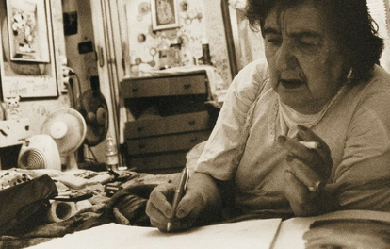
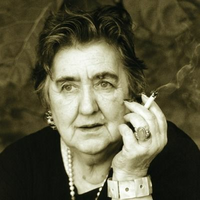
Alda Giuseppina Angela Merini (Milano, 21 marzo 1931 – Milano, 1º novembre 2009) è stata una poetessa, aforista e scrittrice italiana. «Ho la sensazione di durare troppo, di non riuscire a spegnermi: come tutti i vecchi le mie radici stentano a mollare la terra. Ma del resto dico spesso a tutti che quella croce senza giustizia che è stato il mio manicomio non ha fatto che rivelarmi la grande potenza della vita.»
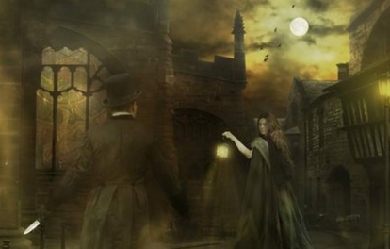

I am an enthusiastic scholar of American, Irish, and English history, Victorian literature, myths, legends, folklore, and Pagan religions. My prose and poetry are generally Gothic in theme and usually set in historical periods. My favourite authors are Edgar Allen Poe, Samuel Clemens, Charles Dickens, Henry James, Sir Arthur Conan Doyle, H.P. Lovecraft, M. R. James, Washington Irving, and Oscar Wilde, just to name a few, and my favourite poets are Keats, Byron, Yeats, Wordsworth, Tennyson, and Longfellow. I have three books of poetry currently on the market, three Gothic novels, one anthology of six horror stories, and several novellas and novelettes. I was raised in Wheatridge, Colorado and attended The University of Colorado at Denver. I currently live in Corvallis, Montana in the great Pacific Northwest.


Edna St. Vincent Millay (February 22, 1892 – October 19, 1950) was an American poet and playwright. She received the Pulitzer Prize for Poetry in 1923, the third woman to win the award for poetry, and was also known for her feminist activism. She used the pseudonym Nancy Boyd for her prose work. The poet Richard Wilbur asserted, "She wrote some of the best sonnets of the century."
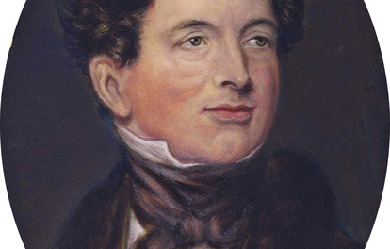
.jpeg)
Thomas Moore (28 May 1779 – 25 February 1852), also known as Tom Moore, was an Irish writer, poet, and lyricist celebrated for his Irish Melodies. His setting of English-language verse to old Irish tunes marked the transition in popular Irish culture from Irish to English. Politically, Moore was recognised in England as a press, or "squib", writer for the aristocratic Whigs; in Ireland he was accounted a Catholic patriot.
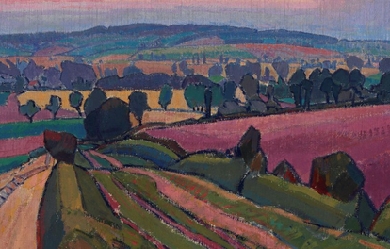
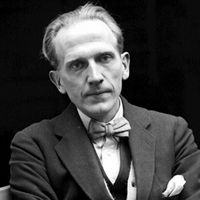
Alan Alexander “A. A.” Milne (/ˈmɪln/; 18 January 1882– 31 January 1956) was an English author, best known for his books about the teddy bear Winnie-the-Pooh and for various poems. Milne was a noted writer, primarily as a playwright, before the huge success of Pooh overshadowed all his previous work. Milne served in both World Wars, joining the British Army in World War I, and was a captain of the British Home Guard in World War II. Biography Alan Alexander Milne was born in Kilburn, London to parents John Vince Milne, who was Scottish, and Sarah Marie Milne (née Heginbotham) and grew up at Henley House School, 6/7 Mortimer Road (now Crescent), Kilburn, a small public school run by his father. One of his teachers was H. G. Wells, who taught there in 1889–90. Milne attended Westminster School and Trinity College, Cambridge where he studied on a mathematics scholarship, graduating with a B.A. in Mathematics in 1903. While there, he edited and wrote for Granta, a student magazine. He collaborated with his brother Kenneth and their articles appeared over the initials AKM. Milne’s work came to the attention of the leading British humour magazine Punch, where Milne was to become a contributor and later an assistant editor. Milne played for the amateur English cricket team the Allahakbarries alongside authors J. M. Barrie and Arthur Conan Doyle. Milne joined the British Army in World War I and served as an officer in the Royal Warwickshire Regiment and later, after a debilitating illness, the Royal Corps of Signals. He was commissioned into the 4th Battalion, Royal Warwickshire Regiment on 17 February 1915 as a second lieutenant (on probation). His commission was confirmed on 20 December 1915. On 7 July 1916, he was injured while serving in the Battle of the Somme and invalided back to England. Having recuperated, he was recruited into Military Intelligence to write propaganda articles for MI 7b between 1916 and 1918. He was discharged on 14 February 1919, and settled in Mallord Street, Chelsea. He relinquished his commission on 19 February 1920, retaining the rank of lieutenant. After the war, he wrote a denunciation of war titled Peace with Honour (1934), which he retracted somewhat with 1940's War with Honour. During World War II, Milne was one of the most prominent critics of fellow English writer P. G. Wodehouse, who was captured at his country home in France by the Nazis and imprisoned for a year. Wodehouse made radio broadcasts about his internment, which were broadcast from Berlin. Although the light-hearted broadcasts made fun of the Germans, Milne accused Wodehouse of committing an act of near treason by cooperating with his country’s enemy. Wodehouse got some revenge on his former friend (e.g., in The Mating Season) by creating fatuous parodies of the Christopher Robin poems in some of his later stories, and claiming that Milne “was probably jealous of all other writers.... But I loved his stuff.” Milne married Dorothy “Daphne” de Sélincourt in 1913 and their son Christopher Robin Milne was born in 1920. In 1925, A. A. Milne bought a country home, Cotchford Farm, in Hartfield, East Sussex. During World War II, A. A. Milne was Captain of the British Home Guard in Hartfield & Forest Row, insisting on being plain “Mr. Milne” to the members of his platoon. He retired to the farm after a stroke and brain surgery in 1952 left him an invalid, and by August 1953 “he seemed very old and disenchanted”. Milne died in January 1956, aged 74. Literary career 1903 to 1925 After graduating from Cambridge in 1903, A. A. Milne contributed humorous verse and whimsical essays to Punch, joining the staff in 1906 and becoming an assistant editor. During this period he published 18 plays and 3 novels, including the murder mystery The Red House Mystery (1922). His son was born in August 1920 and in 1924 Milne produced a collection of children’s poems When We Were Very Young, which were illustrated by Punch staff cartoonist E. H. Shepard. A collection of short stories for children Gallery of Children, and other stories that became part of the Winnie-the-Pooh books, were first published in 1925. Milne was an early screenwriter for the nascent British film industry, writing four stories filmed in 1920 for the company Minerva Films (founded in 1920 by the actor Leslie Howard and his friend and story editor Adrian Brunel). These were The Bump, starring Aubrey Smith; Twice Two; Five Pound Reward; and Bookworms. Some of these films survive in the archives of the British Film Institute. Milne had met Howard when the actor starred in Milne’s play Mr Pim Passes By in London. Looking back on this period (in 1926), Milne observed that when he told his agent that he was going to write a detective story, he was told that what the country wanted from a “Punch humorist” was a humorous story; when two years later he said he was writing nursery rhymes, his agent and publisher were convinced he should write another detective story; and after another two years, he was being told that writing a detective story would be in the worst of taste given the demand for children’s books. He concluded that “the only excuse which I have yet discovered for writing anything is that I want to write it; and I should be as proud to be delivered of a Telephone Directory con amore as I should be ashamed to create a Blank Verse Tragedy at the bidding of others.” 1926 to 1928 Milne is most famous for his two Pooh books about a boy named Christopher Robin after his son, Christopher Robin Milne, and various characters inspired by his son’s stuffed animals, most notably the bear named Winnie-the-Pooh. Christopher Robin Milne’s stuffed bear, originally named “Edward”, was renamed “Winnie-the-Pooh” after a Canadian black bear named Winnie (after Winnipeg), which was used as a military mascot in World War I, and left to London Zoo during the war. “The pooh” comes from a swan called “Pooh”. E. H. Shepard illustrated the original Pooh books, using his own son’s teddy, Growler ("a magnificent bear"), as the model. The rest of Christopher Robin Milne’s toys, Piglet, Eeyore, Kanga, Roo and Tigger, were incorporated into A. A. Milne’s stories, and two more characters– Rabbit and Owl– were created by Milne’s imagination. Christopher Robin Milne’s own toys are now under glass in New York where 750,000 people visit them every year. The fictional Hundred Acre Wood of the Pooh stories derives from Five Hundred Acre Wood in Ashdown Forest in East Sussex, South East England, where the Pooh stories were set. Milne lived on the northern edge of the forest at Cotchford Farm, 51.090°N 0.107°E / 51.090; 0.107, and took his son walking there. E. H. Shepard drew on the landscapes of Ashdown Forest as inspiration for many of the illustrations he provided for the Pooh books. The adult Christopher Robin commented: “Pooh’s Forest and Ashdown Forest are identical”. Popular tourist locations at Ashdown Forest include: Galleon’s Lap, The Enchanted Place, the Heffalump Trap and Lone Pine, Eeyore’s Sad and Gloomy Place, and the wooden Pooh Bridge where Pooh and Piglet invented Poohsticks. Not yet known as Pooh, he made his first appearance in a poem, “Teddy Bear”, published in Punch magazine in February 1924. Pooh first appeared in the London Evening News on Christmas Eve, 1925, in a story called “The Wrong Sort Of Bees”. Winnie-the-Pooh was published in 1926, followed by The House at Pooh Corner in 1928. A second collection of nursery rhymes, Now We Are Six, was published in 1927. All three books were illustrated by E. H. Shepard. Milne also published four plays in this period. He also “gallantly stepped forward” to contribute a quarter of the costs of dramatising P. G. Wodehouse’s A Damsel in Distress. The World of Pooh won the Lewis Carroll Shelf Award in 1958. 1929 onwards The success of his children’s books was to become a source of considerable annoyance to Milne, whose self-avowed aim was to write whatever he pleased and who had, until then, found a ready audience for each change of direction: he had freed pre-war Punch from its ponderous facetiousness; he had made a considerable reputation as a playwright (like his idol J. M. Barrie) on both sides of the Atlantic; he had produced a witty piece of detective writing in The Red House Mystery (although this was severely criticised by Raymond Chandler for the implausibility of its plot). But once Milne had, in his own words, "said goodbye to all that in 70,000 words" (the approximate length of his four principal children’s books), he had no intention of producing any reworkings lacking in originality, given that one of the sources of inspiration, his son, was growing older. In his literary home, Punch, where the When We Were Very Young verses had first appeared, Methuen continued to publish whatever Milne wrote, including the long poem “The Norman Church” and an assembly of articles entitled Year In, Year Out (which Milne likened to a benefit night for the author). In 1930, Milne adapted Kenneth Grahame’s novel The Wind in the Willows for the stage as Toad of Toad Hall. The title was an implicit admission that such chapters as Chapter 7, “The Piper at the Gates of Dawn”, could not survive translation to the theatre. A special introduction written by Milne is included in some editions of Grahame’s novel. Legacy and commemoration The rights to A. A. Milne’s Pooh books were left to four beneficiaries: his family, the Royal Literary Fund, Westminster School and the Garrick Club. After Milne’s death in 1956, one week and six days after his 74th birthday, his widow sold her rights to the Pooh characters to Stephen Slesinger, whose widow sold the rights after Slesinger’s death to the Walt Disney Company, which has made many Pooh cartoon movies, a Disney Channel television show, as well as Pooh-related merchandise. In 2001, the other beneficiaries sold their interest in the estate to the Disney Corporation for $350m. Previously Disney had been paying twice-yearly royalties to these beneficiaries. The estate of E. H. Shepard also received a sum in the deal. The copyright on Pooh expires in 2026. In 2008, a collection of original illustrations featuring Winnie-the-Pooh and his animal friends sold for more than £1.2 million at auction in Sotheby’s, London. Forbes magazine ranked Winnie the Pooh the most valuable fictional character in 2002; Winnie the Pooh merchandising products alone had annual sales of more than $5.9 billion. In 2005, Winnie the Pooh generated $6 billion, a figure surpassed by only Mickey Mouse. A memorial plaque in Ashdown Forest, unveiled by Christopher Robin in 1979, commemorates the work of A. A. Milne and Shepard in creating the world of Pooh. Milne once wrote of Ashdown Forest: “In that enchanted place on the top of the forest a little boy and his bear will always be playing”. In 2003, Winnie the Pooh was listed at number 7 on the BBC’s survey The Big Read. In 2006, Winnie the Pooh received a star on the Hollywood Walk of Fame, marking the 80th birthday of Milne’s creation. That same year a UK poll saw Winnie the Pooh voted onto the list of icons of England. Several of Milne’s children’s poems were set to music by the composer Harold Fraser-Simson. His poems have been parodied many times, including with the books When We Were Rather Older and Now We Are Sixty. The 1963 film The King’s Breakfast was based on Milne’s poem of the same name. Religious views Milne did not speak out much on the subject of religion, although he used religious terms to explain his decision, while remaining a pacifist, to join the British Home Guard: “In fighting Hitler”, he wrote, “we are truly fighting the Devil, the Anti-Christ... Hitler was a crusader against God.” His best known comment on the subject was recalled on his death: The Old Testament is responsible for more atheism, agnosticism, disbelief—call it what you will—than any book ever written; it has emptied more churches than all the counter-attractions of cinema, motor bicycle and golf course. He also wrote the poem “Explained”: Works Novels * Lovers in London (1905. Some consider this more of a short story collection; Milne did not like it and considered The Day’s Play as his first book.) * Once on a Time (1917) * Mr. Pim (1921) (A novelisation of his play Mr. Pim Passes By (1919)) * The Red House Mystery (1922) * Two People (1931) (Inside jacket claims this is Milne’s first attempt at a novel.) * Four Days’ Wonder (1933) * Chloe Marr (1946) Non-fiction * Peace With Honour (1934) * It’s Too Late Now: The Autobiography of a Writer (1939) * War With Honour (1940) * War Aims Unlimited (1941) * Year In, Year Out (1952) (illustrated by E. H. Shepard) Punch articles * The Day’s Play (1910) * Once A Week (1914) * The Holiday Round (1912) * The Sunny Side (1921) * Those Were the Days (1929) [The four volumes above, compiled] Newspaper articles and book introductions * The Chronicles of Clovis by “Saki” (1911) [Introduction to] * Not That It Matters (1920) * By Way of Introduction (1929) Story collections for children * A Gallery of Children (1925) * Winnie-the-Pooh (1926) (illustrated by Ernest H. Shepard) * The House at Pooh Corner (1928) (illustrated by E. H. Shepard) * Short Stories Poetry collections for children * When We Were Very Young (1924) (illustrated by E. H. Shepard) * Now We Are Six (1927) (illustrated by E. H. Shepard) Story collections * The Secret and other stories (1929) * The Birthday Party (1948) * A Table Near the Band (1950) Poetry * For the Luncheon Interval [poems from Punch] * When We Were Very Young (1924) (illustrated by E. H. Shepard) * Now We Are Six (1927) (illustrated by E. H. Shepard) * Behind the Lines (1940) * The Norman Church (1948) * “The Knight Whose Armor Didn’t Squeak” Screenplays and plays * Wurzel-Flummery (1917) * Belinda (1918) * The Boy Comes Home (1918) * Make-Believe (1918) (children’s play) * The Camberley Triangle (1919) * Mr. Pim Passes By (1919) * The Red Feathers (1920) * The Bump (1920, Minerva Films), starring Aubrey Smith * Twice Two (1920, Minerva Films) * Five Pound Reward (1920, Minerva Films) * Bookworms (1920, Minerva Films) * The Great Broxopp (1921) * The Dover Road (1921) * The Lucky One (1922) * The Truth About Blayds (1922) * The Artist: A Duologue (1923) * Give Me Yesterday (1923) (a.k.a. Success in the UK) * Ariadne (1924) * The Man in the Bowler Hat: A Terribly Exciting Affair (1924) * To Have the Honour (1924) * Portrait of a Gentleman in Slippers (1926) * Success (1926) * Miss Marlow at Play (1927) * The Fourth Wall or The Perfect Alibi (1928) (later adapted for the film Birds of Prey (1930), directed by Basil Dean) * The Ivory Door (1929) * Toad of Toad Hall (1929) (adaptation of The Wind in the Willows) * Michael and Mary (1930) * Other People’s Lives (1933) (a.k.a. They Don’t Mean Any Harm) * Miss Elizabeth Bennet (1936) [based on Pride and Prejudice] * Sarah Simple (1937) * Gentleman Unknown (1938) * The General Takes Off His Helmet (1939) in The Queen’s Book of the Red Cross * The Ugly Duckling (1941) * Before the Flood (1951). References Wikipedia—https://en.wikipedia.org/wiki/A._A._Milne

I'm a teenage experimental poet, song writer, and author. I come from a good home but a not so good past. I explain myself through poetry and writing, because there is no other way to described me. I'm just awkward. I have severe depression and anxiety, along with other problems and struggles, and writing helps ease it all. I have love and passion for my work, and I plan on becoming a published author in the future. I try to use all senses of perspective in my writing; I wish to help change the world one poem at a time. ***PLEASE DO NOT COPYRIGHT WHAT IS PUBLISHED ON THIS BLOG. ONLY SHARE UNDER MY NAME AND ESTABLISH CORRECT OWNERSHIP. I CLAIM THESE WORKS AS MY OWN AND UNDER NO CIRCUMSTANCES SHOULD I BE BLAMED FOR FRAUD, OR HAVE PERSONS DENY ME MY RIGHTS BECAUSE OF MY AGE AND SOCIAL STANDING. MY WRITINGS, MY NAME, MY STORY, MY RIGHT. PLEASE RESPECT MY OWNERSHIP AND RESPECT MY WISHES AS A YOUNG ADULT WRITER.*** ~THANK YOU~
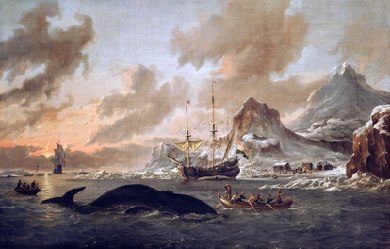
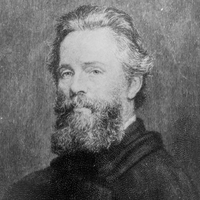
Herman Melville (August 1, 1819– September 28, 1891) was an American novelist, short story writer, and poet of the American Renaissance period best known for Typee (1846), a romantic account of his experiences in Polynesian life, and his whaling novel Moby-Dick (1851). His work was almost forgotten during his last thirty years. His writing draws on his experience at sea as a common sailor, exploration of literature and philosophy, and engagement in the contradictions of American society in a period of rapid change. He developed a complex, baroque style: the vocabulary is rich and original, a strong sense of rhythm infuses the elaborate sentences, the imagery is often mystical or ironic, and the abundance of allusion extends to Scripture, myth, philosophy, literature, and the visual arts.
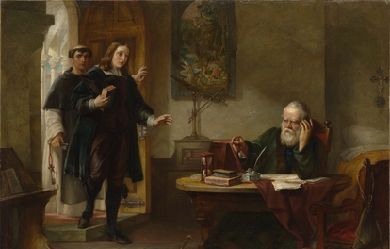
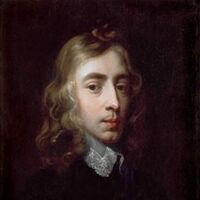
John Milton (9 December 1608 – 8 November 1674) was an English poet, polemicist, a scholarly man of letters, and a civil servant for the Commonwealth (republic) of England under Oliver Cromwell. He wrote at a time of religious flux and political upheaval, and is best known for his epic poem Paradise Lost. Milton's poetry and prose reflect deep personal convictions, a passion for freedom and self determination, and the urgent issues and political turbulence of his day. Writing in English, Latin, and Italian, he achieved international renown within his lifetime, and his celebrated Areopagitica, (written in condemnation of pre-publication censorship) is among history’s most influential and impassioned defenses of free speech and freedom of the press.
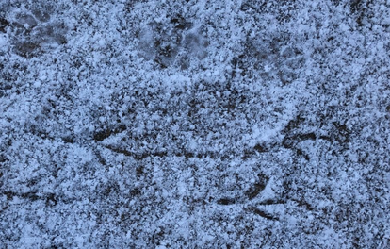
Environmental scientist and maybe a poet. I suspect like most people on here I have an urge to write. I've been much buoyed by kind words and likes over the years on this site, despite been in the weeds and not writing for the past few. Now I have my head above the water I can hear my muse again. Thank you kindly for stopping by. I love reading work by others at all stages of their writing journey. Bon Voyage!
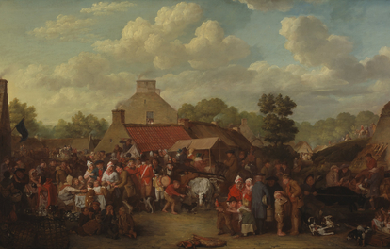
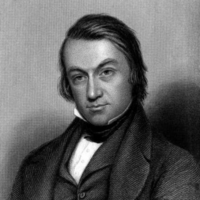
Charles Mackay (27 March 1814– 24 December 1889) was a Scottish poet, journalist, author, anthologist, novelist, and songwriter, remembered mainly for his book Extraordinary Popular Delusions and the Madness of Crowds. He was born in Perth. His father, George Mackay, was a bombardier in the Royal Artillery, and his mother Amelia Cargill died shortly after his birth. His birthdate was 26 March 1812, although he always gave it as 27 March 1814.


Leopoldo Minaya: poeta, fabulista y autor de teatro en lengua castellana. Originario del nordeste de la isla de Santo Domingo (noviembre 15, 1963), en la América Insular. La presente selección pretende abarcar todas las modalidades poéticas cultivadas por el autor: lírica, épico-lírica, dramática, aforística, satírica, amatoria, social, mística e infantil-juvenil. Ofrece igualmente una muestra de su prosa en asuntos de interés teológico y de crítica escritural. Los trabajos literarios de Minaya no pretenden reflejar criterios personales del autor, imparcial e impasible al través del desarrollo de los textos; antes bien, trasvasan voces verosímiles de entes nominados, eventuales o anónimos... que al manifestarse, afirmar, mediar o contraponerse, permiten que sea al lector a quien corresponda armar el tablero de la Realidad. La luz del mundo es (debería ser) la voz de todos, en adición a las voces predominantes de intereses instituidos, doctrinas, prejuicios, ignorancias, fanatismos y dogmas... en este universo pródigo y edificante alumbrado por la razón y ensombrecido por la sinrazón del hombre. Hay, en la producción estética de Leopoldo Minaya, inclinación a la experiencia mística, la teodicea y la exopoesía*. Sus temas remiten a la filosofía existencial, la teología, la jurisprudencia, la filosofía política, el texto satírico y la acción teatral.
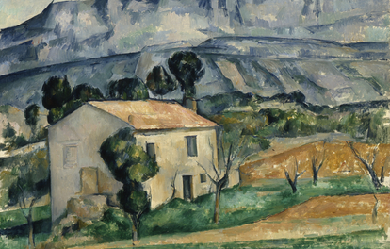
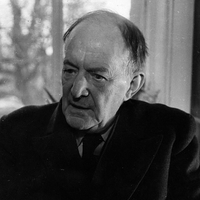
Walter John de la Mare (25 April 1873– 22 June 1956) was an English poet, short story writer and novelist. He is probably best remembered for his works for children, for his poem “The Listeners”, and for subtle psychological horror stories, amongst them “Seaton’s Aunt” and “Out of the Deep”. His 1921 novel Memoirs of a Midget won the James Tait Black Memorial Prize for fiction, and his post-war Collected Stories for Children won the 1947 Carnegie Medal for British children’s books.

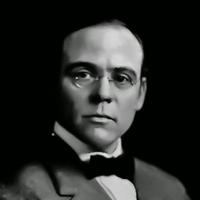
Edgar Lee Masters (August 23, 1868– March 5, 1950) was an American attorney, poet, biographer, and dramatist. He is the author of Spoon River Anthology, The New Star Chamber and Other Essays, Songs and Satires, The Great Valley, The Serpent in the Wilderness An Obscure Tale, The Spleen, Mark Twain: A Portrait, Lincoln: The Man, and Illinois Poems. In all, Masters published twelve plays, twenty-one books of poetry, six novels and six biographies, including those of Abraham Lincoln, Mark Twain, Vachel Lindsay, and Walt Whitman. Life and career Born in Garnett, Kansas to attorney Hardin Wallace Masters and Emma J. Dexter, his father had briefly moved to set up a law practice, then soon moved back to his paternal grandparents’ farm near Petersburg in Menard County, Illinois. In 1880 they moved to Lewistown, Illinois, where he attended high school and had his first publication in the Chicago Daily News. The culture around Lewistown, in addition to the town’s cemetery at Oak Hill, and the nearby Spoon River were the inspirations for many of his works, most notably Spoon River Anthology, his most famous and acclaimed work. He attended Knox Academy in 1889–90, a now defunct preparatory program run by Knox College, but was forced to leave due to his family’s inability to finance his education. After working in his father’s law office, he was admitted to the Illinois bar and moved to Chicago, where he established a law partnership in 1893 with the law firm of Kickham Scanlan. He married twice. In 1898 he married Helen M. Jenkins, the daughter of Robert Edwin Jenkins, a lawyer in Chicago, and had three children. During his law partnership with Clarence Darrow from 1903 to 1908, Masters defended the poor. In 1911 he started his own law firm, despite three years of unrest (1908–11) caused by extramarital affairs and an argument with Darrow. Two of his children followed him with literary careers. His daughter Marcia pursued poetry, while his son Hilary Masters became a novelist. Hilary and his half-brother Hardin wrote a memoir of their father. Masters died at a nursing home on March 5, 1950, in Melrose Park, Pennsylvania, age 81. He is buried in Oakland cemetery in Petersburg, Illinois. His epitaph includes his poem, “To-morrow is My Birthday” from Toward the Gulf (1918): Good friends, let’s to the fields…After a little walk and by your pardon, I think I’ll sleep, there is no sweeter thing.Nor fate more blessed than to sleep. I am a dream out of a blessed sleep-Let’s walk, and hear the lark. Family history Edgar’s father was Hardin Wallace Masters, whose father was Squire Davis Masters, whose father was Thomas Masters, whose father was Hillery Masters, the son of Robert Masters (born c. 1715, Prince George’s County, Maryland, the son of William W. Masters and wife Mary Veatch Masters). Edgar Lee Masters wrote in his autobiography, Across Spoon River (1936), that his ancestor Hillery Masters was the son of “Knotteley” Masters, but family genealogies show that Hillery and Notley Masters were, in fact, brothers. Poetry Masters first published his early poems and essays under the pseudonym Dexter Wallace (after his mother’s maiden name and his father’s middle name) until the year 1903, when he joined the law firm of Clarence Darrow. Masters began developing as a notable American poet in 1914, when he began a series of poems (this time under the pseudonym Webster Ford) about his childhood experiences in Western Illinois, which appeared in Reedy’s Mirror, a St. Louis publication. In 1915 the series was bound into a volume and re-titled Spoon River Anthology. Years later, he wrote a memorable and invaluable account of the book’s background and genesis, his working methods and influences, as well as its reception by the critics, favorable and hostile, in an autobiographical article notable for its human warmth and general interest. Although he never matched the success of his Spoon River Anthology, he did publish several other volumes of poems including Book of Verses in 1898, Songs and Sonnets in 1910, The Great Valley in 1916, Song and Satires in 1916, The Open Sea in 1921, The New Spoon River in 1924, Lee in 1926, Jack Kelso in 1928, Lichee Nuts in 1930, Gettysburg, Manila, Acoma in 1930, Godbey, sequel to Jack Kelso in 1931, The Serpent in the Wilderness in 1933, Richmond in 1934, Invisible Landscapes in 1935, The Golden Fleece of California in 1936, Poems of People in 1936, The New World in 1937, More People in 1939, Illinois Poems in 1941, and Along the Illinois in 1942. Lincoln: the Man In 1931 Masters published the biography Lincoln: the Man, which demythologizes Abraham Lincoln, portraying him as a tool of bankers wanting a new Bank of the United States, “that political system which doles favors to the strong in order to win and keep their adherence to the government”, and advocates “a people taxed to make profits for enterprises that cannot stand alone”. He claimed the Whig Party led by Lincoln’s mentor Henry Clay “had no platform to announce because its principles were plunder and nothing else.” Quotations from the book: “The political history of America has been written for the most part by those who were unfriendly to the theory of a confederated republic, or who did not understand it. It has been written by devotees of the protective principle [tariff], by centralists, and to a large degree by New England.” “For in six weeks he was to inaugurate a war without the American people having anything to say about it. He was to call for and send troops into the South, and thus stir that psychology of hate and fear from which a people cannot extricate themselves, though knowing and saying that the war was started by usurpation. Did he mean that he would bow to the American people when the law was laid down by their courts, through which alone the law be interpreted as the Constitutional voice of the people? No, he did not mean that; because when Taney decided that Lincoln had no power to suspend the writ of habeas corpus, Lincoln flouted and trampled the decision of the court.” “The War between the States demonstrated that salvation is not of the Jews, but of the Greeks. The World War added to this proof; for Wilson did many things that Lincoln did, and with Lincoln as authority for doing them. Perhaps it will happen again that a few men, deciding what is a cause of war, and what is necessary to its successful prosecution, may, as Lincoln and Wilson did, seal the lips of discussion and shackle the press; but no less the ideal of a just state, which has founded itself in reason and in free speech, will remain.” Notable works Poetry * A Book of Verses (1898) * Songs and Sonnets (1910) * Spoon River Anthology (1915) * Songs and Satires (1916) * Fiddler Jones (1916) * The Great Valley (New York: Macmillan Co., 1916) * Toward the Gulf (New York: Macmillan Co., 1918) * Starved Rock (New York: Macmillan Co., 1919) * Jack Kelso: A Dramatic Poem (1920) * Domesday Book (New York: Macmillan Co., 1920) * The Open Sea (New York: Macmillan Co., 1921) * The New Spoon River (New York: Macmillan Co., 1924) * Selected Poems (1925) * Lichee-Nut Poems (American Mercury, Jan. 1925) * Lee: A Dramatic Poem (1926) * Godbey: A Dramatic Poem (1931), sequel to Jack Kelso (1920) * The Serpent in the Wilderness (1933) * Richmond: A Dramatic Poem (1934) * Invisible Landscapes (1935) * Poems of People (1936) * The Golden Fleece of California (1936) (poetic narrative) * The New World (1937) * More People (1939) * Illinois Poems (1941) * Along the Illinois (1942) * Silence (1946) * George Gray * Many Soldiers * The Unknown Biographies * Children of the Market Place: A Fictitious Autobiography (New York: Macmillan Co., 1922). Life of Stephen Douglas. * Levy Mayer and the New Industrial Era (New Haven: Yale University Press, 1927). Chicago attorney Levy Mayer (1858-1922). * Lincoln: The Man (1931) * Vachel Lindsay: A Poet in America (1935) * Across Spoon River: An Autobiography (memoir) (1936) * Whitman (1937) * Mark Twain: A Portrait (1938) Books * The New Star Chamber and Other Essays (1904) * The Blood of the Prophets (1905) (play) * Althea (1907) (play) * The Trifler (1908) (play) * Mitch Miller (novel) (1920) * Skeeters Kirby (novel) (1923) * The Nuptial Flight (novel) (1923) * Kit O’Brien (novel) (1927) * The Fate of the Jury: An Epilogue to Domesday Book (1929) * Gettysburg, Manila, Acoma: Three Plays (1930) * The Tale of Chicago (1933) * The Tide of Time (novel) (1937) * The Sangamon (Chicago: University of Illinois Press, 1942, 1988) Awards & honors Masters was awarded the Mark Twain Silver Medal in 1936, the Poetry Society of America medal in 1941, the Academy of American Poets Fellowship in 1942, and the Shelly Memorial Award in 1944. In 2014, he was inducted into the Chicago Literary Hall of Fame. References Wikipedia—https://en.wikipedia.org/wiki/Edgar_Lee_Masters


- AUTOBIOGRAFIA - Nací al suroccidente del departamento del Huila en Colombia, en San Sebastián de la Plata, en el hogar conformado por Euclides Dussán Dussán y Lulú García de Dussán. Tiempo después la familia se trasladó en busca de nuevos horizontes a la capital del Valle del Cauca (Cali) y es allí donde se desarrolla buena parte de mi adolescencia. Realice mis estudios primarios en el colegio de las hermanas Vicentinas (Cali) y la educación superior con las Hermanas Salesianas en Neiva, a donde nos regresamos después de muchos años. Fue una época bonita con una madre dedicada y piadosa y un padre trabajador, consentidor y amoroso que marco mi camino y el de mis seis hermanos; siendo muy joven un mortal cáncer pulmonar lo separo de nosotros pero su puesto frente al timón del buque lo ocupo por siempre esa luchadora y consagrada mamá. Finalizando el año 1977, me casé con Víctor Manuel Salgado Aramendez, con quien concebimos a Víctor Manuel Jr, María Catalina y Diana Lorena, ya con sus vidas realizadas en el campo profesional me hicieron abuela de seis hermosas criaturas que son mi dilección. Observadora de detalles, soñadora sentimental, llorona de nacimiento, una mañana de diciembre encontré una página en blanco y decidí que aquello que soñaba lo podía plasmar; y es el 29 de septiembre de 2009, un día antes de mi cumpleaños que recibí un correo electrónico de una persona conocida para que visitara un hermoso blog que se llamaba “Alma y Letras”. Mi dos primeras publicaciones “SECUNDANDO EL SILENCIO”, seguida de “LAS DOS” son prosas poética en las que libremente se desliza mi sensibilidad en el diario vivir frente a la naturaleza, cambiando de carácter para enfrentar con rebeldía el necio mundo que me rodea. El “MAR DE LAS 9 MUSAS” en el que inicie el 22 jun 2011, me otorgo varios reconocimientos y me fueron subidas varias poesías como lectura recomendada. Hoy hago parte de dos distinguidos foros. “EL RINCON DEL POETA” y “POESIA A MEDIA NOCHE”, dirigidos ambos por un staff de ilustres maestros en lírica de habla hispana.
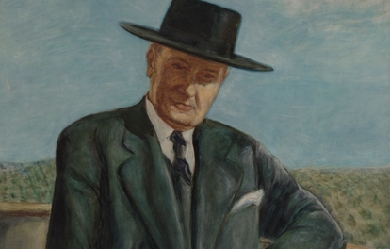
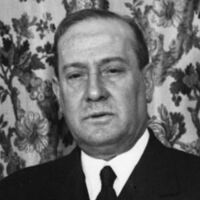
Manuel Machado y Ruiz (Sevilla, 1874 - Madrid, 1947) Poeta español. Hermano mayor del gran poeta Antonio Machado, es una figura representativa del espíritu modernista en la poesía española de su época. Su personalidad a la vez cosmopolita y andaluza se plasma en una lírica en la que el gusto modernista coexiste con los motivos populares. Se trasladó con su familia a Madrid en 1883 y se formó en la Institución Libre de Enseñanza. Vivió largas temporadas en París, donde entró en contacto con la poesía simbolista francesa. En 1910 contrajo matrimonio con su prima Eulalia Cáceres, mujer profundamente religiosa, y trabajó como archivero y bibliotecario. Durante la Guerra Civil colaboró con el aparato de propaganda nacionalista y fue elegido miembro de la Real Academia Española (1938).
Soñadora por naturaleza, amante de la vida, del amor y de la naturaleza, constante y fiel seguidora de la armonìa, considerando que es el abrebocas a la paz que este mundo ansìa y pide a gritos, en cualquier lugar donde haya un motivo, aporto mi granito de arena... con un silencio, con un abrazo, con una mirada tierna, con una sonrisa alegre o compasiva, no fingida, desprendida de mi pensamiento y de mi alma que sugiere un perdón, negación, o aceptaciòn, con una palabra amable y sincera, a veces fuerte, a veces suave, dependiendo de còmo sople el viento, sin temor a equivocarme por que soy humano, sin temor a pedir perdòn aunque este sea negado, considerando que es màs importante aceptar equivocaciones, que seguir equivocado creyèndonos perfectos. Mis mejores Activos patrimoniales Dios, Patria, amigos, alegrìa, paz y amor. Tengo una hermosa familia que me hace compañìa. Mi entregado compañero, mi hijo que ha sido el mejor regalo, mis 5 queridos hermanos con su prole, queda de mis ancestros unos cuàntos tìos que a veces frecuento. Mis transaciones personales que van y vienen. el dinero, la tristeza,y la sabidurìa.


